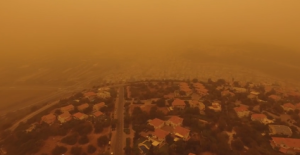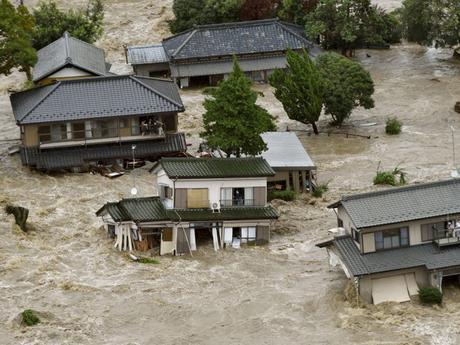With all that's going on this year meteorologically, at what point do people give in and admit that there is global warming, first and that, second, it is, in fact at least heavily human-influenced if not out-and-out humankind created and that we have to do things about it? And soon as possible.
There have been many, many weather events this year, certainly, like all the hundreds of fires across Canada, Alaska, Washington state, Oregon, Idaho and California, at minimum.
Jul 27, 2015 Scorched earth: U.S. wildfires
near record level
What Washington state's wildfires tell us about climate change
Wildfires have now burned a massive
8 million acres
Then, more recently, like yesterday, there was the unprecedented, unseasonable and deadly sandstorm in the Middle East.

Hugeduststormroarsthrough MiddleEast
For the second week in a row, an expansive dust storm slashed visibility and put hundreds in the hospital with respiratory ailments across the Middle East. The countries most affected include Syria, Lebanon, Israel and Jordan.
This storm comes soon after another dust storm, which was shaped like a pinwheeling cyclone that absorbed light, drastically lowered visibility across Iraq on Sept. 1.
'Unprecedented' sandstorm blasts across
Middle East
'Unprecedented' sandstorm envelops Lebanon and Syria
Massive sandstorm blankets Middle East for a second day
Not only was there this 2 day sandstorm across several nations in the Middle East but there have actually been many duststorms, internationally, across the globe of late:
Mystery of the dust storms
sweeping the world
Today we get word of another unprecedented rain and flooding in Japan and not just heavy but, again, unprecedented.

Terrified residents wait for evacuation by helicopter as the overflowing Kinugawa River rages through Joso, Ibaraki prefecture; 90,000 people were forced to flee their homes
Japan floods: City of Joso hit by
'unprecedented' rain
Record rainfall in Japan has burst riverbanks, ripped houses from their foundations and forced over 100,000 people to flee their homes. The aftermath of Typhoon Etau has also washed tons of radioactive water from the ruined Daiichi nuclear power plant into the Pacific.
In dramatic scenes reminiscent of the tsunami disaster that struck the country’s coast in 2011, residents of Joso City, 34 miles north-east of Tokyo, were rescued from rooftops by Self-Defence Force helicopters. Houses were swamped by a muddy deluge from the Kinugawa River as people were winched to safety, some clutching family pets.
Check out this facts of this rain and flood (emphasis added here):
Weeks of near-daily rain had already left much of Ibaraki and Tochigi prefectures, north/north-east of Tokyo, deluged before the typhoon struck, dumping over 500mm (about 20 inches) of precipitation in just 24 hours in some places – twice the average for the entire month of September. At one point early today over 900,000 people were advised to evacuate. So far, more than 90,000 had been forced to flee the “wall of water”.
It seems the recurring adjective in all this is that each of these events, vastly different as they are and from far flung corners of the planet, is "unprecedented." It's either unprecedented or historic or record-breaking, all true and applicable here.
Other "unprecedented" factors this year? Here's one:
2015 May Just Be Hottest Year on Record
Here's another:
World's Glaciers Melting Faster Than
Ever Before Recorded
And this last one:
Sea level rise accelerating faster
than thought
Mind you, these aren't projections, either. This isn't warnings now of what could or might happen in the future. These things are already occurring and they are occurring now, not 20 or 50 or 100 years in the future. And all these events are killing thousands upon thousands of people and displacing and making homeless millions.
Put those few things together---warmer temperatures, more glacier and ice cap melt and rising oceans and to what simple but obvious conclusion do you surely have to come?
